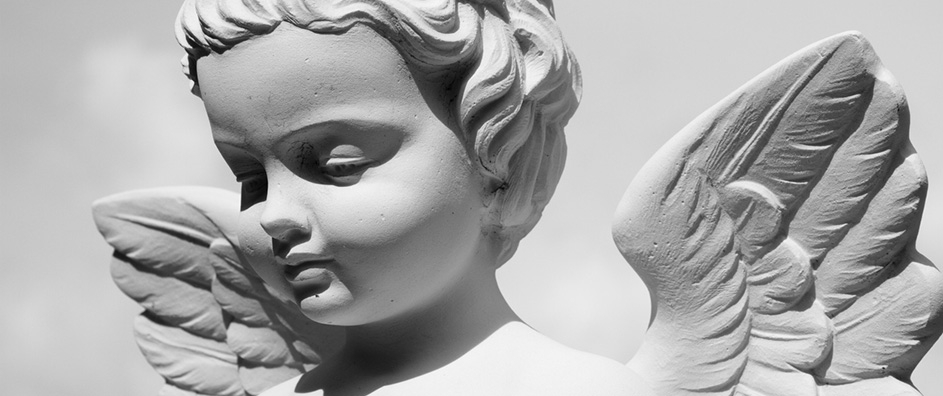The views expressed in our content reflect individual perspectives and do not represent the authoritative views of the Baha'i Faith.
When my stray, sick kitten died, my grief knew no bounds, and tears poured down like a deluge.
Only now do I think I know why I grieved so or why that pure grief was similar to what I felt the day we laid my father to rest. Both the kitten and Dad were so unobtrusive in this world, where only the garish din of the famous and infamous garner public attention or concern.
But there was something else. In both these deaths I discovered my own isolation, my own secret pain and self-induced loneliness. That desperate look in the kitten’s eyes as it felt itself falling irretrievably from this world was like the look in Dad’s eyes when only he, struggling to articulate the ineffable, felt himself falling.
And that look of meek and humble candor, that moment of pure clarity, was what I so longed to have for myself, to share without guile or pretense my most secret heart. That kitten, my lovely father, they were sharing this with me—the slings and arrows of outrageous children, poisonous chemicals coursing through the brain, the loss of all control. I had known this. I knew what they felt, but I could explain it to no one who would understand. Like them, some part of me wanted to be bundled in a soft blanket and receive in my goblet a drop of the wine of unconditional love.
Poor Johnny. Poor Johnny-Bump. He hurt himself again. He fall down and go boom.
But the Bump—the adult me—would get up again. He would get back on the path again, and, by the grace of God, he would find someone who understood how Faulkner was wrong—that the basest of all things is not to be afraid, not exactly. Being afraid is the natural course of things. It is entirely unavoidable and acceptable. Even Francis MacComber in that short part of his “happy” life, was afraid—he simply decided to ignore the fear.
No, the basest of all things, I learned, is to be lonely, utterly alone and in despair. It matters not whether the despair is because of the loss of a kitten or the loss of a father or the loss of love. It matters not whether the despair is real, or whether it results from some chemicals out of balance in the brain:
One must never consider one’s own feebleness, it is the strength of the Holy Spirit of Love, which gives the power …. The thought of our own weakness could only bring despair. We must look higher than all earthly thoughts; detach ourselves from every material idea, crave for the things of the spirit; fix our eyes on the everlasting bountiful Mercy of the Almighty, who will fill our souls with the gladness of joyful service to His command “Love One Another.” – Abdu’l-Baha, Paris Talks, p. 40.
My brother once told me of a conversation he had with someone who at the time was his best friend—he always maintained a very discrete circle of very close friends who had in common the single virtue that they thought and felt deeply about life, and played chess. Anyhow, he posed to this friend the following hypothesis: Suppose you were totally happy but completely crazy—say, you live in a mental asylum. Would you accept such a bargain? The friend thought long about his answer. “So I’m completely crazy but totally happy?” he repeated. “Yes,” Bill responded, “you are ecstatically happy at every moment of your existence, but you are totally insane.”
The friend finally answered that since the purpose of life is to be happy, if he were totally happy, and naturally he wouldn’t even know he was insane: “Of course I would accept such a bargain,” he concluded. “One would have to be crazy not to accept it. Wouldn’t you?”
Bill’s answer was quick and firm—he would never accept such a bargain. For Bill the purpose in life was to learn the truth about reality. For Bill, this objective was more important than being happy. If forced to choose, he would always sacrifice happiness for truth.
And so he did, but often at a terrible cost. Part of the cost was burning himself out so that he died at age seventy when he might have lived another ten years or so had he devoted himself to living “easily, decorously.”
Now that same truth had become my own code, my daily mantra. I could not, would not live a lie any longer. I would make art.
You May Also Like
Comments

















"As I lay dying, your lips moved to speak a word
of care, and that is the one thing that gives me breath." ~ Tahirih, from "A Portrait in Poetry"
too. I am obsessed with getting to
the heart of a matter, which you
always seem to do quickly. Your
beloved brother followed Shoghi
Effendi in giving so much it shortened his time! Anyway, the
common idea that happiness is
life's purpose is really kind of an
"urban legend" !